Weddings
Space Age Bridal Creation
March 1962: Arlette Dobson and John Richard took a stroll along London's Park Lane while modeling a "space age bridal outfit."I'd like to see a wedding with the bride and groom wearing these outfits, and the bridesmaids in Gianangelli's lunar bathing suits.
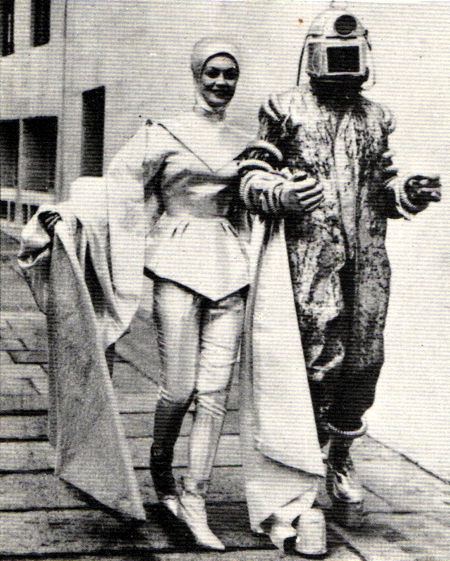
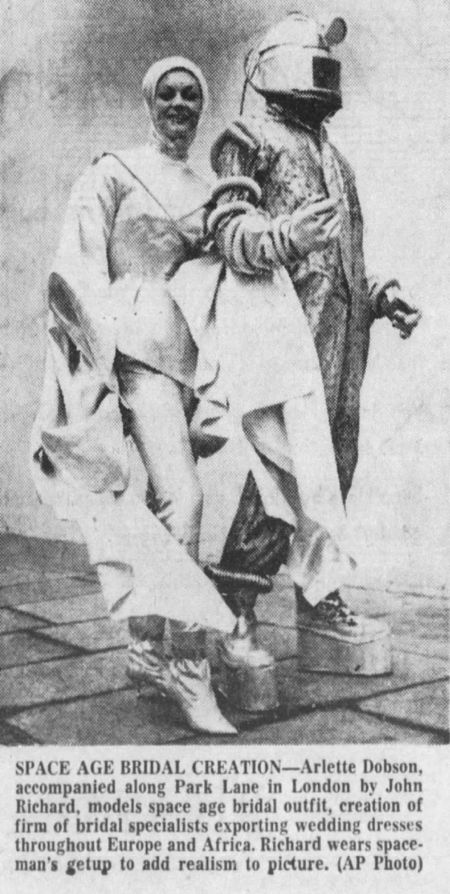
Rochester Democrat and Chronicle - Mar 10, 1962
Posted By: Alex - Tue Dec 06, 2016 -
Comments (3)
Category: Fashion, 1960s, Weddings
Caveman Wedding
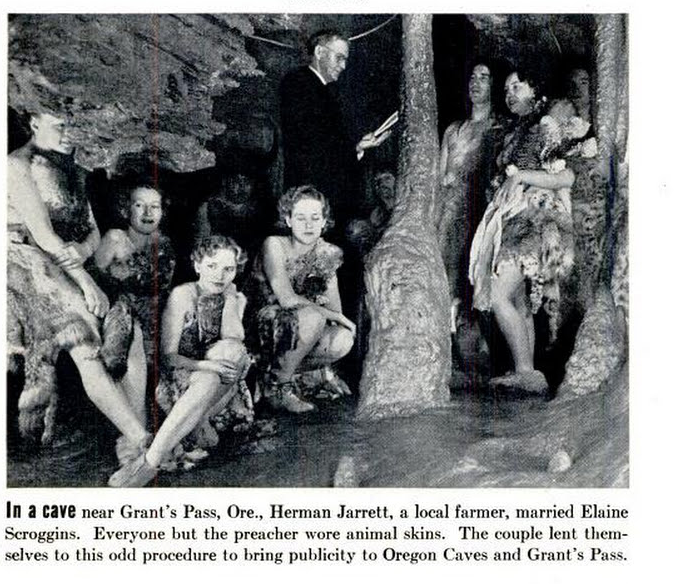
Original photo here.
Also, more weird weddings at the link.
Posted By: Paul - Thu Oct 27, 2016 -
Comments (0)
Category: Archaeology, 1930s, Weddings
Mrs. Living Corpse
June 9, 1966: After being buried alive for a week outside of a drive-in theater in Denison, Texas, Lottie Howard married "Country" Bill White. Both of them were "buried alive" practitioners. After she was disinterred, the two left on their honeymoon.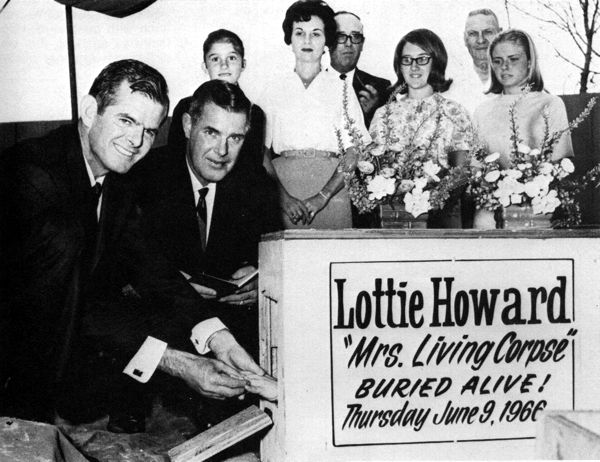
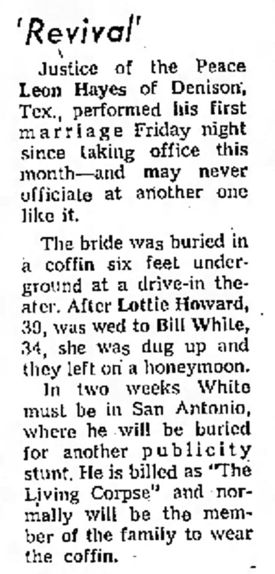
Long Beach Independent Press-Telegram - June 19, 1966
Update: Looks like the marriage didn't last long. Two years later Country Bill got served with divorce papers — while he was buried alive. The papers were dropped down the six-inch pipe he used for air and food.
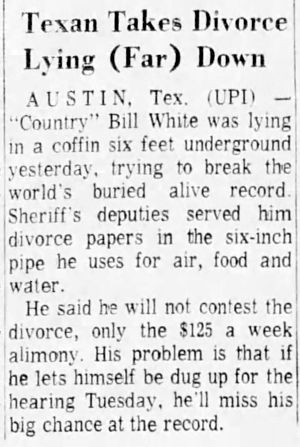
Wilmington News Journal - Mar 28, 1968
But Bill rebounded pretty quickly from his divorce. Just a few months later he was buried alive with a "34-year-old grandmother" and a go-go dancer. However, they each had individual compartments in the coffin, evidently to prevent any buried-alive hanky panky.
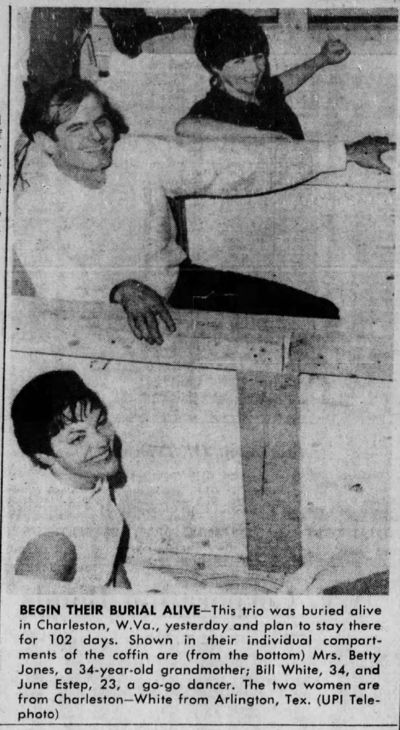
The Indianapolis Star - June 21, 1968
And here's a picture of Bill from 1978, looking a bit rougher around the edges.
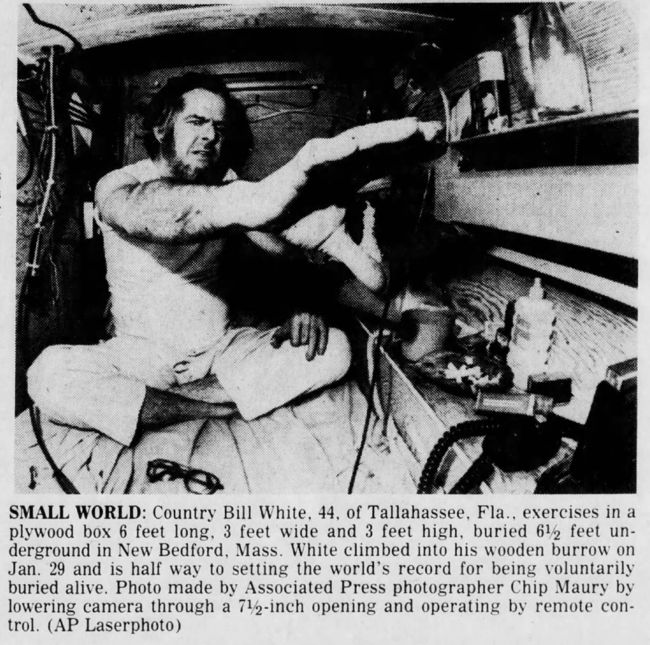
The Benton Harbor News-Palladium - May 19, 1978
As far as I can tell, Bill kept doing his buried alive stunt until the late 1980s. In 1981 he set an endurance record for the longest time buried alive (140 consecutive days in a plywood box, 6 feet long by 3 feet wide). This record seems to have been beaten in 1999 by Geoff Smith, who spent 147 days buried in a coffin under the beer garden of his local pub. Though it's hard to know for sure because Guinness doesn't maintain a record for longest time buried alive (because of their policy of not encouraging unhealthy or life-endangering acts).
In 2005, the New Bedford Standard-Times ran an article about Bill, but that's the last media reference to him I can find. If he's still alive, he'd be around 82.
Posted By: Alex - Sun Oct 23, 2016 -
Comments (1)
Category: 1960s, Weddings
Fell asleep at wedding
The earliest I've found this story reported was in Time magazine (Feb 8, 1954). But then it started popping up in other papers, some as late as 1956 (below). I haven't found any report that went into greater detail. Which makes me wonder if this ever really happened, or if it was one of those amusing fillers reporters sometimes invented to pad column space.The story, as stated, seems a bit implausible. Everyone at the wedding just left without bothering to wake the bride? Really? Even assuming that "dozed off" is a euphemism for "passed out drunk."

The Sikeston Daily Standard - Jan 18, 1956
Posted By: Alex - Tue Aug 02, 2016 -
Comments (3)
Category: 1950s, Weddings
Said no at altar
I guess that's why it's posed as a question. You don't have to say "I do."Anyway, if you're 16, the correct response to a marriage request is 'No.' Unfortunately, it seems that Lois did end up getting married a week later, despite her initial reluctance.
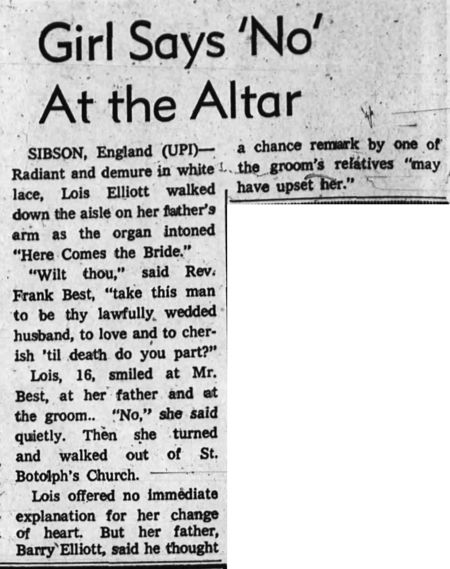
The Ottawa Journal - May 1, 1971
SIBSON, England (UPI) —Radiant and demure in white lace, Lois Elliott walked down the aisle on her father's arm as the organ intoned "Here Comes the Bride."
"Wilt thou," said Rev. Frank Best, "take this man to be thy lawfully wedded husband, to love and to cherish 'til death do you part?"
Lois, 16, smiled at Mr. Best, at her father and at the groom. "No," she said quietly. Then she turned and walked out of St. Botolph's Church.
Lois offered no immediate explanation for her change of heart. But her father, Barry Elliott, said he thought a chance remark by one of the groom's relatives "may have upset her."
Posted By: Alex - Mon Jun 27, 2016 -
Comments (3)
Category: 1970s, Weddings
The Cellophane Wedding
Back in the 1930s, the Jockey underwear company got the idea of showing off their products by having their models wear cellophane and staging a "cellophane wedding." The first picture seems to be a trial run of this stunt, in which the company created outfits that were only half cellophane.But in 1938, they staged a wedding with full cellophane outfits at the National Association of Retail Clothiers and Furnishers convention. The story goes that a picture of this event subsequently ran in Life magazine, by which means it then came to the attention of Adolf Hitler, who used it as an opportunity to fulminate against America's moral decline.
Sources: Kickshaw Productions, Kenosha News
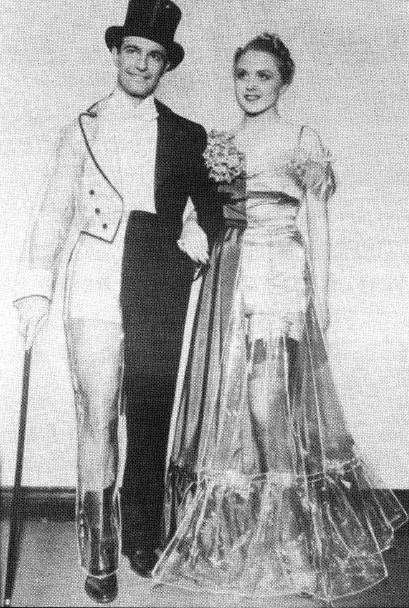
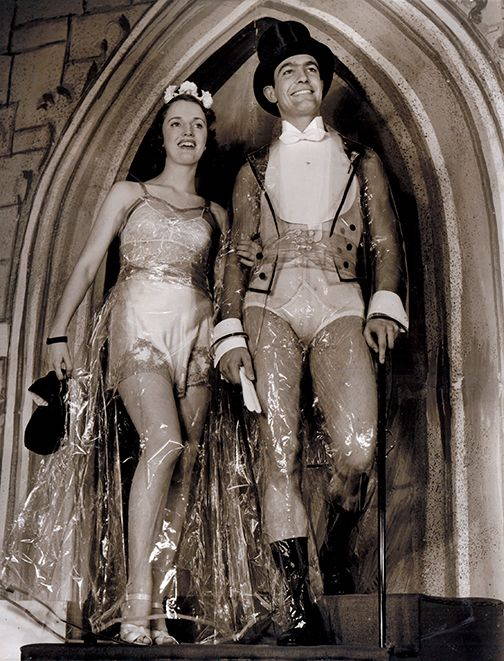
Posted By: Alex - Thu Apr 23, 2015 -
Comments (3)
Category: 1930s, Weddings
Wood Apple Marriage in Nepal
This page semi-coherently explains: "...a ceremony in the Newar community in Nepal in which pre-adolescent girls are 'married' to the bel fruit (wood apple), which is a symbol of the god Vishnu, ensuring that the girl becomes and remains fertile. It is believed that if the girl's husband dies later in her life, she is not considered a widow because she is married to Vishnu, and so already has a husband that is believed to be still alive."
Posted By: Paul - Sat Dec 20, 2014 -
Comments (2)
Category: Food, Children, Foreign Customs, Asia, Weddings
Wedding foiled by scream
About a year ago I posted about a wedding at which the bridegroom dropped dead of a heart attack right after saying "I do." I thought that had to qualify as one of the worst weddings ever, but this one is pretty bad also. As reported in the Chicago Tribune - Sep 21, 1907.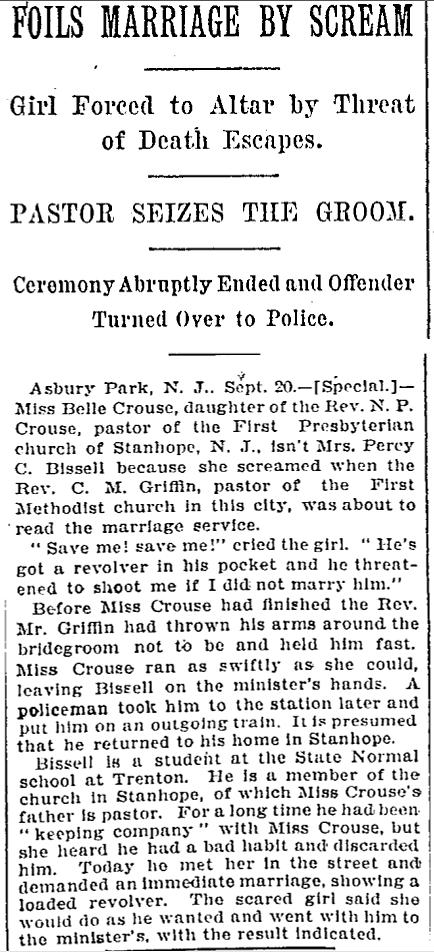
Posted By: Alex - Sat Sep 06, 2014 -
Comments (4)
Category: Marriage, 1900s, Screams, Grunts and Other Exclamations, Weddings
Get married at a sewage plant
Brightwater sewage plant in King County, WA is advertising its availability for weddings. Which sounds a bit weird until you see that it's actually a nice location (well, nice enough; I suppose it depends on how picky one is), and comes at less than half the cost of comparable facilities. So I'd definitely consider it if I were planning a wedding. Why not? However, some people, such as the wedding planner in the video, seem outraged at the mere thought of it.
Posted By: Alex - Sat Apr 12, 2014 -
Comments (10)
Category: Weddings and Marriage, Excrement, Weddings
The Strange World of Divorce
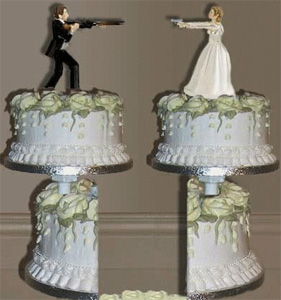
Posted By: Nethie - Sat Jul 31, 2010 -
Comments (4)
Category: Anniversary, Centuries, Ceremonies, Weddings, Customs, Foreign Customs, Marriage

| Who We Are |
|---|
| Alex Boese Alex is the creator and curator of the Museum of Hoaxes. He's also the author of various weird, non-fiction, science-themed books such as Elephants on Acid and Psychedelic Apes. Paul Di Filippo Paul has been paid to put weird ideas into fictional form for over thirty years, in his career as a noted science fiction writer. He has recently begun blogging on many curious topics with three fellow writers at The Inferior 4+1. Contact Us |




